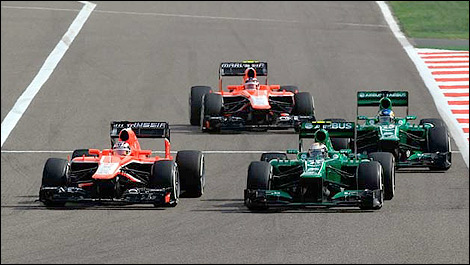Former Marussia driver Max Chilton claims the gap between the fastest and slowest teams in Formula 1 means it isn’t really a sport.
In an interview with Sportsmail, Chilton claims the four-second gap between the lead car and the slowest team in the field stops F1 being sport, and that sport should have a level playing field.
Chilton also claims IndyCar drivers enjoy their time more because the series doesn’t involve as much travelling. The 26-year-old believes travelling around the world with F1 means drivers don’t get the same perks as IndyCar racers, hailing the camaraderie between the drivers, who spend time together in their motorhomes. The British driver spent two seasons and made 35 starts with Marussia before switching to IndyCar for the 2016 season.
Chilton spent his two years in F1 stuck at the back of the pack in a car unable to challenge the front-runners. His best finishes came at the 2014 Australian and Bahrain Grands Prix where he crossed the line 13th, but both results were aided by a string of retirements. Chilton knows the pain of being a driver in a car that just isn’t in the same league as those at the head of the field. However, part of F1 is the development race, seeing which teams build the best car, who has the best engine and who can find the loophole in the regulations that makes their car just that little bit quicker. Giving every driver the same machinery would make F1 a very different sport, making it much more about the drivers than the engineering and technology.
Some argue that wouldn’t be a bad thing! Putting all drivers in similar cars would give us a clearer idea of who is really the best driver in F1, and could stop the teams with the biggest budgets dominating as much. Depending on what spec was agreed upon though, it could also price some of the smaller teams off the grid. The gap between those running at the front and at the back is so big that only three teams have won a race since Kimi Raikkonen’s victory for Lotus at the 2013 Australian Grand Prix, with Ferrari and Red Bull both going an entire season without a win in that time.
Chilton believes IndyCar’s closer field makes it a more entertaining series, particularly with next year’s changes. In 2018, all cars will have the same aero kit, while Chilton believes there’s very little difference between the engines, which should make next year’s racing even closer. IndyCar does seem to suit Chilton better than F1 – his best finish in the American series was his fourth-placed finish at Indianapolis earlier this year, while a string of further top 10 finishes helped him secure 11th in the driver’s standings. He’ll be with a new team in 2018, ending a two-year stint with Chip Ganassi Racing to join Carlin’s IndyCar venture, having previously raced for the British outfit in GP2 and Indy Lights.
Chilton may make some valid points, but making F1 a level playing field goes against the spirit of the series, undermines the concept of the constructors’ championship and just wouldn’t appeal to teams like Ferrari and Mercedes. F1 isn’t perfect, but that doesn’t mean it’s not sport.

